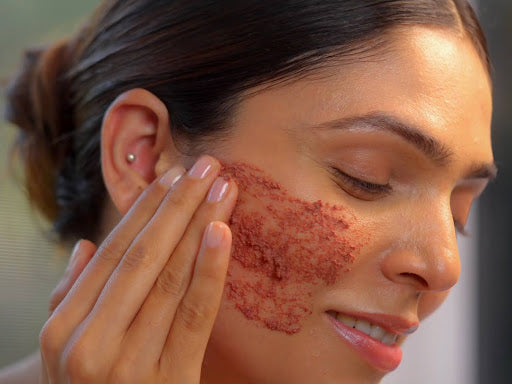You’re sipping water like a fish, checking your skincare labels, and choosing well researched actives and natural ingredients. But if sunscreen isn’t part of your daily routine, your glow game is missing a key player.
Here’s the truth:
The sun doesn’t take a day off- and neither should your sunscreen. Whether you’re working by a sunny window or meeting friends outside, sunscreen protects your skin from more than just a tan.
Still wondering why sunscreen is so important? Let’s dive in.
What is SPF?
SPF stands for Sun Protection Factor. It is your skin’s bodyguard against UVB rays, the ones that cause sunburn and damage - even cancer.
But hear this:
SPF DOES NOT tell you how long you can stay outside. It tells you how much sun damage you’re dodging. And UVB isn’t the only villain. For us Indians, UVA rays are the real bad ones that sneak deep into our skin and speed up ageing too.
That’s why you need a broad-spectrum sunscreen that guards against both UVA and UVB. (Source:UCI Health)
4 Benefits Of Sunscreen For Face and Body
All the advantages of sunscreen make it a hero of your skin care stack. Here is how:
1. Reduces Skin Cancer Risk
The main, most important benefit that makes sunscreen essential is that it blocks harmful rays that can mess with your DNA. Using it daily, EVEN WHEN IT IS CLOUDY, EVEN WHEN YOU’RE INDOORS - cuts your risk of skin cancer (melanoma). (Source: Skincancer.Org)
2. Helps Prevent Premature Ageing
Fine lines, wrinkles, and loss of skin elasticity can show on your face, and how! In fact, UV exposure breaks down collagen and elastin- , the stuff that keeps your skin firm. To that end, one of the most important advantages of sunscreen is that it helps protect these building blocks.
3. Keeps Your Skin Tone Even & Seamless
Sun exposure can trigger dark spots, hyperpigmentation and patches. The benefits of wearing sunscreen on your face daily is that it keeps your skin looking smooth, clear, and bright.
4. Protects Sensitive Skin
If you deal with rosacea, eczema, or redness, UV rays can make it worse. Sunscreen acts like a calming shield against irritation from the sun. Another feather in its cap that highlights the importance of sunscreen.
How Does Sunscreen Work?
You could have the perfect skincare products lineup, your curated AM routine - face wash, toner, serum - but if you skip sunscreen, you’re leaving your skin exposed.
Here’s how sunscreen saves the day:
It's Your Invisible Armour
Sunscreen acts like a barrier, blocking UVA and UVB rays, even when you’re indoors by a window.
Two Types of Sunscreens Heroes
- Chemical sunscreens: Absorb UV rays and turn them into heat.
- Physical (mineral) sunscreens: Sit on your skin’s surface and reflect the rays away.
At JiViSa, we craft the CLEANSEST sunscreens that blend clean ingredients with modern science - so your skin gets the best of both worlds. Sun Lush by JiViSa is a chemical sunscreen that is reef-save, EU-Approved and most importantly has the right PA++++ rating to protect Indian skins.
Broad Spectrum = Total Skin Win
A good sunscreen protects you from both UVA and UVB rays. That’s called broad-spectrum. And yes, you need it every single day.
How Much Sunscreen to Use?
Follow the two-finger rule: apply a strip of sunscreen along your index and middle finger to cover your face and neck properly. Reapply every 2-3 hours if you’re out in the sun.
Difference Between Natural Sunscreen VS Chemical Sunscreens
Take a look at the difference between natural and chemical sunscreens and how they can protect your skin:
|
Feature |
Natural Sunscreen |
Chemical Sunscreen |
|
How it works |
Natural sunscreens sit on the skin's surface to reflect and scatter the UV rays. |
These get absorbed into the skin and convert UV rays into heat, which is then released. |
|
Ingredients |
Peptides, ceramides, and other EU-approved ingredients in JiVisa’s Sun Lush SPF 50 PA++++ Weightless Matte Sunscreen that is broad spectrum, doesn't feel heavy and works overtime to protect your skin. |
Octinoxate, oxybenzone, etc. |
|
Coverage |
Broad spectrum, and they can block both UVA and UVB rays. |
It depends upon the formulation. Some filters can cover only UVA or UVB. |
|
Skin compatibility |
Natural sunscreens are good for sensitive skin, acne-prone skin, and even children. |
Chemical sunscreens can cause irritation or breakouts for sensitive skin types. |
|
Application |
They start working immediately after the application. |
These need around half an hour to get activated. |
Hence Proven: Your Glow Needs Backup
Youthful, glowing skin isn’t a happy accident - it’s the result of smart, daily habits. Sunscreen is one of the biggest game-changers and honestly, a non-negotiable that you can add to your skincare ritual. As we discussed above, the benefits of sunscreen are far too powerful to ignore.
At JiViSa, we believe clean beauty should work hard for you. Our sunscreens are powered by nature, backed by science, and crafted with care. So is JiViSa’s complete face care range.
Make sunscreen part of your daily rhythm - because your skin deserves nothing less.
FAQs around the Benefits of Sunscreen
-
Does sunscreen darken skin?
No, sunscreen will not darken your skin. In fact, one of the most noteworthy benefits of wearing sunscreen on your face every day is that it helps manage sun-induced pigmentation or dark spots.
-
Does sunscreen cause acne?
A well-formulated natural sunscreen that is non-comedogenic, lightweight, and made with EU-approved ingredients will not trigger breakouts. To that end, JiViSa’s clean beauty formulations will help you navigate your skin problems and reinforce your overall skin health.
-
When should I reapply my sunscreen?
You should reapply your sunscreen every 2-3 hours, especially if you are out in the sun. Consistent reapplication will ensure that you continue to experience the benefits of sunscreen, no matter where you are.
-
What is the two-finger rule for sunscreen?
The two-finger rule means applying a strip of sunscreen along the length of your index and middle finger to get the right amount for your face and neck.





